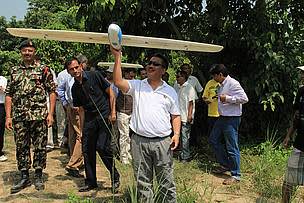Nepal to Deploy Aerial Drones to Monitor Poacher Activity
OutdoorHub Reporters 06.21.12

Nepal’s conservation workers will soon have a helping hand in the sky to monitor poaching activity: unmanned aerial vehicles, commonly referred to as drones. The machines can observe both the effects of poaching and habitat loss that affect endangered species.
Developed by the World Wildlife Fund (WWF), the pilotless aircraft have had some initial use in Indonesia. Talks are underway to introduce them elsewhere, such as Tanzania and Malaysia.
The drones are small, controlled by remote from the ground, and are light enough to launch by hand. From the WWF press release,
The remote-controlled Conservation Drone is equipped with cameras and GPS to help capture images and video from hard-to-reach areas in the landscape, thereby serving as a remarkable conservation tool. It is two meters in width and flies at a maximum elevation of 200 meters. It can cover a distance of up to 25 kilometers within a duration of 45 minutes.
“We hope these drones will be useful in detecting poachers as they enter the parks,” Dr. Serge Wich, a biologist with the Anthropological Institute at the University of Zurich and one of the innovators behind the project, told the BBC.
“If they see poachers in the area, they can send out a team to catch them.”
The drones are inexpensive. Each one costs about $2,500. In addition, the cost of operation is low. Electric batteries that can be recharged from the grid in about half an hour power the drone. Developers are hopeful that this will make them affordable to conservationists in developing countries where budgets are limited.
In Nepal, rhinos and tigers are poached for various body parts that fetch a high price on the black market.
In Indonesia, the drones have already been used to track orangutans and other endangered species while at the same time monitor deforestation.
Test flights have already been completed in Nepal and pilot training is now the next step. The country should see operational use begin in just a few months’ time.

